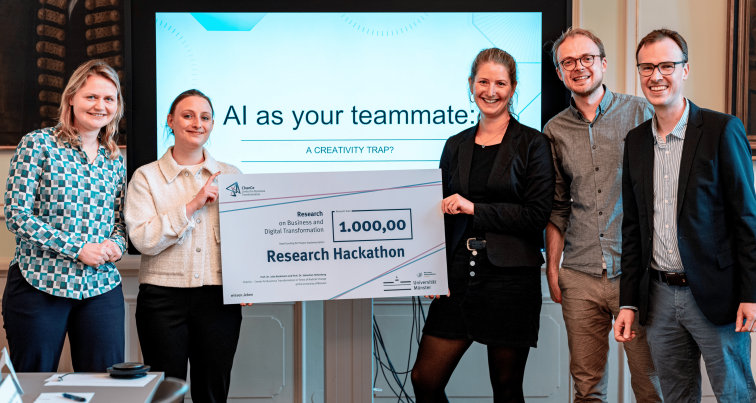Research Update from the Winners of the 2024 Research Hackathon: "AI as a Team Member"

In 2024, the research team consisting of Sophia A. Kohlenberg, Dr. Matthias Sinnemann, Rick Shi, and Dr. Marleen Voss won the ChanCe Research Hackathon. Their idea, which convinced the jury of experts from both academia and practice, focused on how AI influences team creativity during collaboration. ChanCe followed up to learn how the project has progressed and what to expect in the future.
After the 2024 Research Hackathon – what happened next for you as a team?
The hackathon was a great source of inspiration! The feedback we received showed us that our project is of interest not only to academia but also to practitioners. We therefore took a closer look at the current research literature on AI and creativity in order to gain a better understanding of the current state of science and to further develop our own research project in a targeted manner.
In simple terms, what is the main goal of your study?
Our primary aim is to explore how teamwork dynamics change when AI is involved. While many studies focus on how individuals interact with AI, the impact on team collaboration remains largely unexplored. We want to determine whether teams perceive AI as an independent team member or merely as a supporting tool – and what implications this has for teamwork.
Have you already conducted specific research steps?
Yes, we have conducted initial team experiments as a pilot study. We compared teams working without AI support to those that had access to ChatGPT. Our focus was on both team collaboration and the communication between team members and the AI.
Are there any initial findings from the experiments with the students?
A final data analysis is not yet available, but initial observations show that the type of collaboration and, in particular, communication and coordination within the team are changing significantly. One major challenge appears to be the seamless integration of ChatGPT into teamwork, as this requires a different form of coordination. Currently, there seems to be a break in verbal communication between team members, as instructions to the AI are usually given in text form, i.e. via chat. However, once this is successful and the team has got used to it, there is great potential for increasing team creativity.
What are the next steps for the project "AI as a Team Member"?
The next step is to expand our experiment with a larger sample size, as we have only studied 20 teams so far. To obtain statistically robust and meaningful results, we aim to increase this number to approximately 60 teams. Our findings will first be presented at international conferences, such as the Academy of Management in 2026, to gather feedback from scholars specializing in AI and teamwork. Additionally, we are in discussions with SMEs to apply our research approach in real-world work environments. A project proposal for this has already been submitted. So, things are moving forward!
Best of luck with your research!

